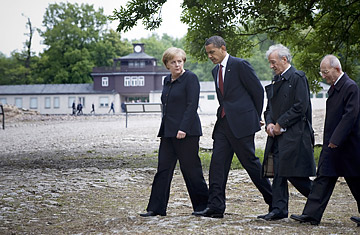
From left: German Chancellor Angela Merkel, U.S. President Barack Obama and former Nazi concentration-camp inmates Elie Wiesel and Bertrand Herz visit the camp at Buchenwald, near the eastern German city of Weimar
When it comes to humanity's darkest moments, time is both a blessing and a curse. Firebombed cities get rebuilt. Saplings grow in abandoned death camps. Wounded soldiers heal or pass on. Yet with rebirth comes the danger of forgetting, of repeating old mistakes and of failing to learn history's bloodiest lessons.
President Barack Obama spent his day Friday, in advance of the 65th anniversary of D-Day, immersed in this contradiction. The morning began in Dresden, the site of one of World War II's worst firebombings, an hourlong aerial bombardment that killed probably tens of thousands of civilians. He visited the Frauenkirch Dresden, a soaring Baroque Protestant church that was destroyed in 1945 by Allied bombs and then rebuilt in 2005, restored to its gilded splendor. In a corner of the church, he lit a candle to remember the dead. (See pictures of Obama in Germany.)
Obama spent his afternoon at the Buchenwald concentration camp, where the Nazis killed 56,000 political, ethnic and religious prisoners between 1937 and 1945. The worst part of the detention center, called "Little Camp," had kept humans on bunks like livestock in buildings meant for horses. Corpses once lined the street, and people were forced to use their food bowls for latrines.
But on Friday the scene was full of life — a verdant forest, overgrown and blossoming, with rolling German farmland in the distance. "There's a certain irony about the beauty of the landscape and the horror that took place here," Obama said after walking through the grounds, as puffy white seedlings floated through the air. Elie Wiesel, the Nobel Peace Prize–winning author, who had been a prisoner at the camp as a teenager, walked with Obama. "If these trees could talk," Wiesel said.
By late afternoon, Obama was making the rounds of the Landstuhl Regional Medical Center, the central clearinghouse for the wounded and sick among America's overseas military. In an average month, between 600 and 800 new patients are admitted, landing on planes at nearby Ramstein Air Force Base. Since the initial U.S. invasion of Afghanistan in 2001, the hospital has treated 10,820 battle wounded. While Obama toured the grounds, the public-address system played a children's nursery chime. It signaled that a woman at the hospital had just given birth; soldiers say it happens all the time. (See pictures of Buchenwald concentration camp at LIFE.com.)
As with everything a United States President does, each of the visits held symbolic value. Obama was serving witness to the consequences of human failure and resilience. At Buchenwald, he spoke of his great-uncle's experience in the 89th Infantry Division as one of the first Americans to reach the concentration camp in 1945. "He returned from his service in a state of shock," the President said, "saying little and isolating himself for months on end from family and friends, alone with the painful memories that would not leave his head."
The lesson Obama took from his family was that the memories needed to be shared, laid out in the open as a warning to future generations. "To this day, there are those who perpetrate every form of intolerance — racism, anti-Semitism, homophobia, xenophobia, sexism and more — hatred that degrades its victims and diminishes us all," he said. "This place teaches us that we must be ever vigilant about the spread of evil in our own time, that we must reject the false comfort that others' suffering is not our problem, and commit ourselves to resisting those who would subjugate others to serve our own interests." The President added, "To this day, there are those who insist that the Holocaust never happened, a denial of fact and truth that is baseless and ignorant and hateful."
Yet even as he spoke, it's clear the world has not learned the lesson. Genocidal killings continue in the Darfur region of Sudan, and a long-running civil war in Sri Lanka recently concluded with the extended shelling of civilian refugee camps. "The world hasn't learned," said Wiesel in a public address before the gates of Buchenwald.
But nature has not changed. Trees will continue to grow in the bomb craters. Children will be born of the tribes targeted for extinction. And on Thursday, Wiesel, a Jewish victim of a German extermination campaign, stood at the gate of the camp that took his father's life, next to the current leader of the nation that once tried to exterminate his people. After speaking, he kissed German Chancellor Angela Merkel on both cheeks.
